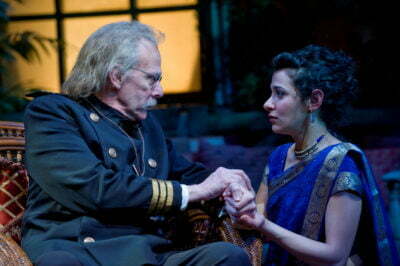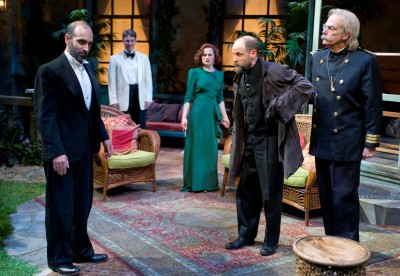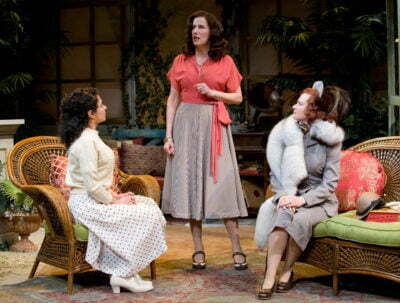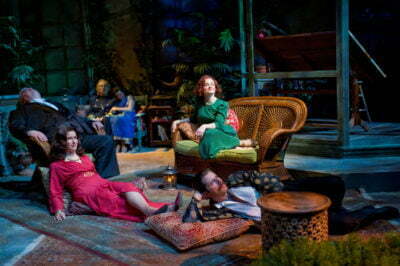Heartbreak House
Heartbreak House

By George Bernard Shaw
Directed by William Brown
At Writers’ Theatre
So spare a thought for us lovers
And the things you left behind
Like kind words from the broken hearted
Sweet words from a tortured mind
Heartbreak House is a sprawling play. It deals with war, class structure, politics, poverty, the leisure class, death, love, and (as one might expect) heartbreak in manifold forms. It is Shaw’s answer to The War to End All Wars, and was written during its height in 1916 and 1917 – although it remained unpublished and unperformed until after the war was over. It was one of the works that marked Shaw’s reascension into the British spotlight, after a fall from grace at the beginning of the War.
Ellie Dunn (Atra Asdou) is invited to dinner at a house in the country by her dear friend, Hesione Hushabye (Janes Woditsch). She is set to marry a captain of industry, Boss Mangan (John Lister), but is in love with another man; her father, however, Mazzini Dunn (Kareem Bandealy), is very poor, and she wishes to alleviate his poverty. Meanwhile, Hesione’s sister, Lady Ariadne Utterword (Tiffany Scott), arrives at the house after 20 years’ absence. Neither Hesione nor their father, the somewhat senile but cripplingly clever Captain Shotover (John Reeger) recognize her at first. Miss Dunn’s fiancé and father arrive, as well as a pursuer of Ariadne, her husband’s brother, Randall (Kevin Christopher Fox). As the play unfolds, it turns out no one is quite what they say they are.
The intricacies of plot and character are manifold, as one would expect from a play of this era, and moreover of Shaw. His wit is clever as ever, and his eye is particularly keenly pointed towards British society. He dissects what money is to those who don’t have it, what it’s not to those who do, and what sorts of things people would have to go through to get it, or keep it. Ellie Dunn needs to marry into money if she’s to have any at all, and so is essentially willing to sacrifice her life, and youth, to a man much older (and wider) than she. Hesione has a husband who does absolutely nothing, and they both live with her father, the Captain, whose only money comes from his inventions. They are living quite hand-to-mouth, even though they have a large house in the country. Lady Utterwood (and her brother-in-law, Randall) are really the only people who want for nothing.
Entwined with, yet distinct from, the issue of money is the issue of class. There is the upper-class (Lady Utterwood), the leisure class (the members of the household), the working poor (the Dunns) . . . and the senses of propriety that go along with them. Ariadne is a fiend for being proper; but she was raised quite the bohemian, which Hesione and Hector Hushabye (Martin Yurek) still enjoy with Captain Shotover. And Mazzini Dunn appears at one point in his night shirt, which of course is highly inappropriate – yet, he feels at ease in the house, for which he praises his hosts. Ariadne is quick to say that he would never feel at ease in his nightshirt in her house, to which he is quick to retort that he shall be sure never to visit. And when the bombers come, it is the highly impractical and utterly romantic (that is to say, bored) Hector who insists on turning all the lights on in the house; and Hesione who hopes they come again tomorrow – even though death crawls in their wake. The visceral possibility of death makes life somehow sweeter – or rather, it makes their lives less dull.
In a way, this play can be a bit tiring (not to say tiresome!): one must always be paying attention, be vigilant, to know the evolutions these characters are going through. But it is not hard to do, as Shaw’s writing is so good, and the acting and directing in this production are stellar. And the director’s decision to set this at the beginning of the Second Great War, rather than the First, seems, to me, to be neither here nor there. It does cause very occasional, very slight awkwardness in the text: the industrial revolution had a few wrinkles ironed out of it by the late thirties, and the extent to which the Indians were looked down upon, though perhaps still the right amount for this time period, felt a little too harsh anyway; that is to say, the amount of possession the citizens of the Empire felt over their colonists makes more sense to me the further back one goes (to an extent, obviously). And yet, this transfer of time does make a lot of sense, and it may, as the director believes, affect the play’s immediacy for modern audiences. Regardless, it is a beautiful production, and a pleasure to watch.
Highly recommended
Will Fink
Reviewed on 4.28.11
For full show information, visit TheatreinChicago.
At Writers’ Theatre, 325 Tudor Court, Glengoe, IL; call 847-242-6000 or visit www.writerstheatre.org; tickets $45-$65; performances Tues. & Wed. at 7:30, Thur. & Fri. at 8pm, Sat. at 4 & 8pm, Sun. at 2 & 6pm; through June 26.




